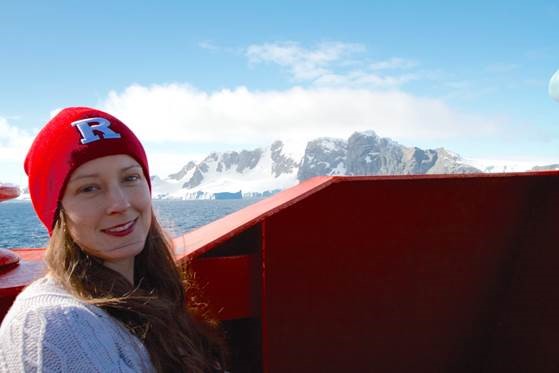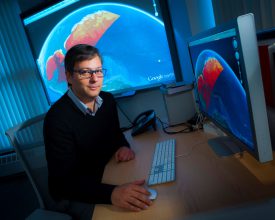
Grace Saba, assistant professor in the Department of Marine and Coastal Sciences.
NOAA’s Climate Program Office and its Coastal and Ocean Climate Applications (COCA) program—in partnership with the National Marine Fisheries Service (NMFS) Office of Science and Technology—competitively awarded seven grants projects last year that focused on increasing the understanding of climate-related impacts on fish stocks and fisheries. Three of the seven grants totaling roughly $5 million were awarded to Rutgers faculty members, Grace Saba, assistant professor in the Department of Marine and Coastal Sciences, Enrique Curchitser, associate professor in the Department of Environmental Sciences and Malin Pinsky, assistant professor in the Department of Ecology, Evolution & Natural Resources.
Both commercial and recreational fisheries provide an important source of jobs, food, recreation and economic activity for the nation and it is vital that these fisheries remain sustainable and resilient. Climate-related impacts have negatively affected marine life and the people, businesses, communities and economies that depend on them. In order to better prepare and respond to these changes, key decision makers from the groups affected need more information.
NMFS and the Office of Oceanic and Atmospheric Research have collaborated to fund research to advance the understanding of current and future climate-related impacts in order to inform decision making to positively promote the sustainable management and resiliency of these essential natural resources.

Enrique Curchitser, associate professor in the Department of Environmental Sciences.
The Rutgers research will focus on three key areas: 1) Indicators of habitat change that affect three key commercial species in the U.S. Northeast Shelf; 2) A high-resolution, physical-biological study of the U.S. Northeast shelf (both past variability and future change); and 3) Climate velocity of the 21st century and its implications for the management of fisheries in the U.S.
The study on indicators of habitat change focuses on the commercial species, black sea bass (Centropristis striata), longfin squid (Doryteuthis pealeii) and spiny dogfish (Squalus acanthias), and is designed to facilitate proactive management of these populations in the face of climate change. Grace Saba is the Rutgers lead principal investigator, with Josh Kohut and Enrique Curchitser serving as co-principal investigators.
The high-resolution, physical-biological study of the Northeastern shelf of the U.S. examines variability in the past and future change of this habitat in order to improve our understanding of futures climate impacts on fish stock. Enrique Curchitser is the Rutgers lead principal investigator on this project.

Malin Pinsky, assistant professor in the Department of Ecology, Evolution & Natural Resources.
The third Rutgers-led project. which is focused on climate velocity, will examine the speed at which zones of suitable climate move across the underwater landscape using an ensemble of projections that will more completely account for the uncertainty in variables such as greenhouse gases than has been done in the past. Malin Pinsky is the Rutgers lead principal investigator on this project.
Read more about this important research at NOAA’s Climate Program Office.

